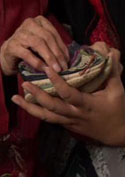

Opening 9 Jun 2005
Directed by:
Tamara Wyss
Writing credits:
Tamara Wyss
This nearly two hour documentary film explores the history of the Yangtze River in China. Writer and director Tamara Wyss has used the diaries of her grandparents who were in the diplomatic service in Cheng Du in the early 1900s to show a China that existed 80 years ago. Conversations with some of the older residents show a glimpse of another way of life, before the building of the controversial Three Gorges Dam.
The Yangtze River is the world’s third largest river, starting from the melting glaciers in China’s Qinghai-Tibet Plateau and winding 6,300 kilometers past Cheng Du, Nanjing and Shanghai into the East China Sea. The river was (and still is) important for transportation and agriculture, the silt deposits creating lush rice fields. Old black and white photos from the diary and interviews with local workers show the laborious means by which boats were pulled upstream by teams of men along the steep river banks.
The Three Gorges area is known for its dramatic beauty and historical and religious significance. Serious architectural studies of the Han people of the Yellow River Valley area were started in the 1920s and were lately under serious time constraints due to the eventual flooding of much of the area from the construction of the dam. This project has necessitated the removal of over one million Chinese from their villages and homes.
One interesting visit was to the home of an elderly woman who had been forced by her mother to bind her feet as a young girl. Although this practice had been formally outlawed in 1911, the tradition continued among the upper class. The woman commented that her parents had often argued about it, but when her father would leave for a business trip the mother would resume the painful binding. She showed a pair of the tiny embroidered shoes, only three inches long.
In 1995 Chinese filmmaker Yang Yenguing had made a film about foot binding
but found that it was a difficult topic for the Chinese people to discuss as it
is closely tied to female sexuality and submissiveness. Thankfully ten years
later this and many other topics are no longer taboo, and film makers can help
the Chinese people to express their new freedoms. (Patricia Ritz)